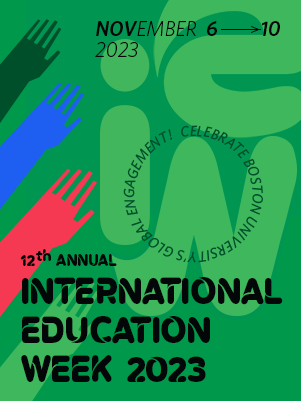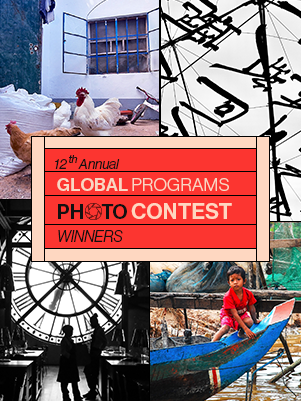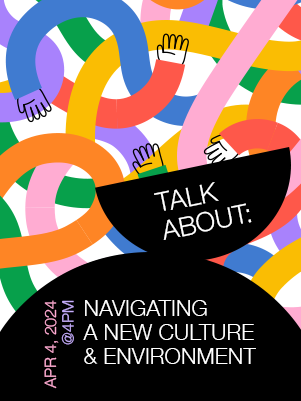In this issue of Global Connections we have focused a number of our stories on a small sample of the many different unique multi school, multi discipline, global research and experiential learning opportunities that BU students have participated in.
In this issue:
- Two Courses, Five Schools, Three Continents
- The Societal Engineer
- Reflecting back: Pardee Advisor looks back on Study Abroad Internship
- BU Study Abroad Global Learning Experience
- CELOP Launches University Readiness Program
- Sea Semester Honored with Public Service Award
Two Courses, Five Schools, Three Continents
The Global Management Experience and the BU Research, Education, Communication & Science (BU RECS) program are two examples of courses that are providing students with global perspectives through a combination of classroom learning and international experience based field study work.
Over spring break, Professor Gregory Stoller took sixteen Boston University students to Beijing and Hong Kong for a newly created course: The Global Management Experience. The four credit course involves analytical work during the first half of the spring semester on campus and culminates with a trip to Asia.
The class brought students together from a variety of backgrounds who have an interest in international entrepreneurship. Questrom, College of Arts & Sciences, and Engineering students were all represented on the trip, an aspect Greg Stoller, senior lecturer at the Questrom School of Business believes is key to a successful global experience. “I’ve always believed in the benefits of having a cross functional team, whether it’s during a standard lecture/discussion course on campus, an international consulting project, or a class like the Global Management Experience,” Stoller says.
At the College of Arts and Sciences, Dave Marchant and his team are also engaging students in coursework with an experiential learning component. BU RECS is a program with a group of 15-20 students from the College of Communication, College of Arts and Sciences, and the School of Education who conduct research about climate change. The value of this year and a half course lies in the integration of research, communication, and outreach. Through this course, not only are the next generation of STEM scientists being developed by Marchant and his team, but Marchant is creating a community of students who believe in the importance of science education and the implications of climate change.
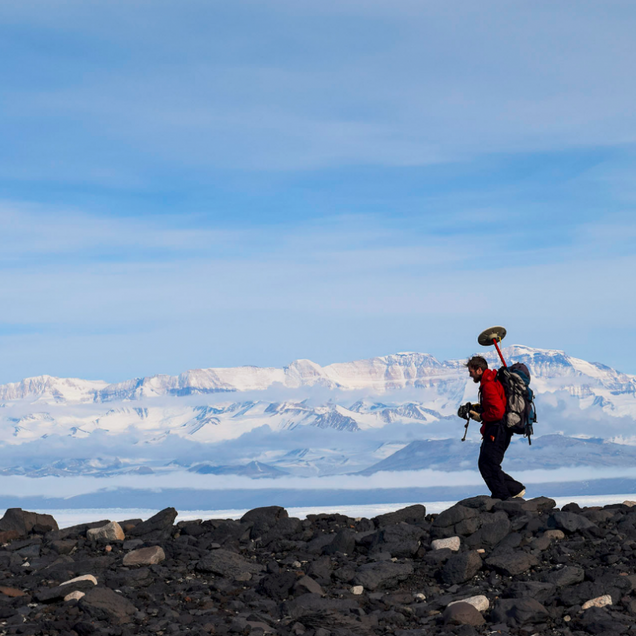 One of the most challenging, yet rewarding and impacting, aspects of this experience is not only conducting detailed, complex research, but then effectively and accessibly communicating the methods and results. “I’ve really expanded my abilities to communicate complex topics through writing, multimedia, and to students in the classroom,” says Daniel Rybarcyzk, a sophomore in the College of Arts and Sciences. Three students receive the opportunity to travel to Antarctica while the rest of the cohort will stay in BU’s state of the art Digital Image Analysis lab, communicating in real time with the students in Antarctica.
One of the most challenging, yet rewarding and impacting, aspects of this experience is not only conducting detailed, complex research, but then effectively and accessibly communicating the methods and results. “I’ve really expanded my abilities to communicate complex topics through writing, multimedia, and to students in the classroom,” says Daniel Rybarcyzk, a sophomore in the College of Arts and Sciences. Three students receive the opportunity to travel to Antarctica while the rest of the cohort will stay in BU’s state of the art Digital Image Analysis lab, communicating in real time with the students in Antarctica.
Emma Chamberlain (CAS ‘18) notes, “After working in Antarctica, I feel confident that I have grown in my abilities to conduct scientific research. But beyond that, I grew as a person. Between surviving three-day snowstorms in nothing but a tent, and hauling heavy packs of rock samples on and off of helicopters, I realized that with a little hard work and some awesome companions, I can survive anything.”
The Societal Engineer
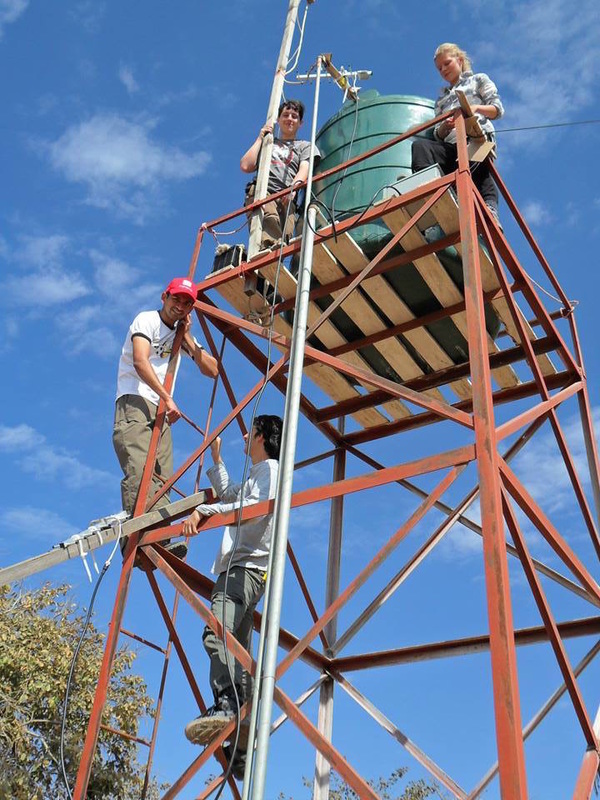
“Creating the Societal Engineer ®” conveys the School of Engineering’s unique mission to develop engineers who combine outstanding technical skills with the drive and ability to solve pressing societal challenges in their future careers. Engineers Without Borders, a student-driven organization, embodies this concept in the work they are doing with organizations across the globe.
Donovan Guttieres (ENG’16) President of the BU chapter of Engineers Without Borders says “The work Engineers Without Borders is doing is not just to make something cool or new but to identify bottlenecks in society and try to overcome these societal issues by using science and technology. Through this experience you have to be purpose driven.”
The group partners with NGOs and local communities to help foster community-driven programs to improve access to basic health needs. BU Engineers Without Borders collaborates with the School of Public Health, the Zambia Center for Applied Health Research & Development (ZCAHRD), and other local NGOs in partnership with the Naluja Community in Zambia’s Southern Province. Guttieres says working with the organizations has been an opportunity to see problems in a larger socioeconomic and global context. “It opens your mind to different cultures,” he says. “As an engineering group we do just as much public health and cultural learning as we do engineering because we can’t develop technology in a silo or in vacuum. Working in Zambia changes your perspective on society and you rethink the assumptions you made about the world.”
Reflecting back: Pardee Advisor looks back on Study Abroad Internship
 Vicky Kelberer is currently a Master’s candidate in the International Affairs program in the Pardee School of Global Studies as well an as academic advisor to 450 undergraduate students enrolled at the school. In January 2016, she wrote a piece for the Huffington Post recollecting her time as an undergrad in the BU Study Abroad Geneva Internship program interning for an Arab Human Rights NGO, Alkarama, in Geneva, Switzerland. The organization was established in 2004 to assist those in the Arab world at risk of extra-judicial executions, disappearances, torture and arbitrary detention.
Vicky Kelberer is currently a Master’s candidate in the International Affairs program in the Pardee School of Global Studies as well an as academic advisor to 450 undergraduate students enrolled at the school. In January 2016, she wrote a piece for the Huffington Post recollecting her time as an undergrad in the BU Study Abroad Geneva Internship program interning for an Arab Human Rights NGO, Alkarama, in Geneva, Switzerland. The organization was established in 2004 to assist those in the Arab world at risk of extra-judicial executions, disappearances, torture and arbitrary detention.
Kelberer reflected on the internship as “one of the most formative professional experiences of my life, and definitely the most important experience I could have had as an undergraduate,” she says. “I was interning there during the Arab Spring and because of it, I really had to hit the ground running. I was able to do projects that gave me insights into legal international human rights work, the United Nations and NGO systems, and the ways that domestic political systems interact with international bodies,” she says.
For Kelberer, the experience at Alkarama changed her global perspective “I don’t think my life has ever been the same since interning at Alkarama,” she says. “The people I worked with both in the office and our employees in the field, were some of the most inspiring people I’ve ever met, and I’m driven every day to live up to their example of selfless dedication to the cause of human rights in some of the most challenging situations in the world
The Frederick S. Pardee School at Boston University fosters students who look at global issues from a multidisciplinary approach and have a desire for knowledge about how to engage with the world. Kelberer finds that the internship experience intersects with her role as an academic advisor. “I think the experience overall makes me a much better advisor. I love seeing my students’ evolution as they participate in internship programs, as almost everyone comes back to BU galvanized by their experience, and more dedicated than ever to their work and their field.”
BU Study Abroad Global Learning Experience
In an effort to help students build a reflective framework during their time abroad, Study Abroad created a one credit on-line course that was launched in spring 2015, The Global Learning Experience. Debra Terzian, Director of Academic Affairs at BU Study Abroad believes that this course gives students the opportunity to be better prepared for study abroad and reflect back on the process in a more thoughtful way. “The course is designed to encourage students to think about what they are experiencing and to be more intentional with respect to their semester abroad. It is designed to help students make sense of the cultural differences they encounter and to consider what values may underlie certain behaviors and practices,” says Terzian.
The course initially was open to students going to London and Madrid. The course has continued to evolve since its launch and is currently taught by Celia Bianconi and Sue Griffin, faculty from the Department of Romance Studies, and it is now being offered to students going to Dresden, Grenoble, London, Madrid, Padua, Paris, Sydney, and Venice. With the increased number of locations and desire to provide a supportive online community for the students, Professors Bianconi and Griffin suggested transitioning the course to Facebook. The move to Facebook has generated exponential growth in terms of student participation. The Facebook page is private and allows students to discuss with each other aspects of their study abroad experience.
The course is taught in three different phases beginning before students leave for their program, continues while they are abroad and finishes after they have returned to the U.S. Each phase has a series of assignments posted online throughout the course and at the end of each assignment the instructors begin a new discussion which ties together themes and common experiences. Students are encouraged to continue the discussion on this forum.
Sue Griffin says the course “allows students to reflect on the study abroad process as they are experiencing it and maximize what they have learned.” Students’ final assignments help them reflect on how their study abroad experience has benefitted them in terms of new skills and perspectives and how they can effectively market those skills. In the fall the course will be open to all students on a BU study Abroad program.
CELOP Launches University Readiness Program
CELOP has continued its tradition of partnering with schools on campus to help prepare students in their academic and professional careers. Most recently, CELOP launched the University Readiness program to help students adapt to life in the United States. The three week program is for students who have been admitted to an undergraduate or graduate degree program in the U.S. The goals of the program are to provide students with an extended orientation and help students learn about academic and social interactions as well as further develop their English skills.
The program covers three topics: academic success, campus interactions, and coping with challenges. At the end of the three week program, students should feel more prepared to start their degree program. CELOP has worked with the Engineering and Law schools to develop and deliver programs to to help prepare their international students.
For more information about CELOP programs contact celop@bu.edu.
SEA Semester Honored with Public Service Award
 In April, the National Science Board – the policymaking body for the National Science Foundation – awarded SEA Semester its 2016 Public Service Award as a result of the valuable experiences the program provides to students. The award recognizes groups that have made contributions to increasing public understanding of science and engineering in the United States. “The 2016 National Science Board Public Service Award offers incredible recognition and validation of the work that we do and the experience we provide,” said Peg Brandon, President of SEA.
In April, the National Science Board – the policymaking body for the National Science Foundation – awarded SEA Semester its 2016 Public Service Award as a result of the valuable experiences the program provides to students. The award recognizes groups that have made contributions to increasing public understanding of science and engineering in the United States. “The 2016 National Science Board Public Service Award offers incredible recognition and validation of the work that we do and the experience we provide,” said Peg Brandon, President of SEA.
Since 1971, SEA Semester – a Boston University accredited study abroad program – has been providing study abroad experiences at sea that focus on topics ranging from climate change and biodiversity to sustainability and conservation policy. SEA Semester, a global teaching, learning and research community, is dedicated to the exploration, understanding and stewardship of marine and maritime environments, and thus to the study of humanity’s relationship with the oceans.
SEA Semester students begin their experience in Woods Hole, Massachusetts, on Cape Cod, where they take coursework in a variety of topics suited to the region in which they will be sailing and the program in which they’re enrolled. Students then take their research questions into the field and test them while sailing as working crewmembers aboard two 134-foot sailing research vessels.
The cross-disciplinary approach to global ocean issues allows students from all majors to come together and address a common challenge from multiple perspectives. “This creates a rich learning community in which students can develop not only a holistic understanding of human impacts on the environment but also increased skills in collaboration, leadership, and problem-solving,” said Katharine Enos, Dean of Admissions. As a result, SEA semester students are left prepared and inspired to address complex problems in a variety of settings.






